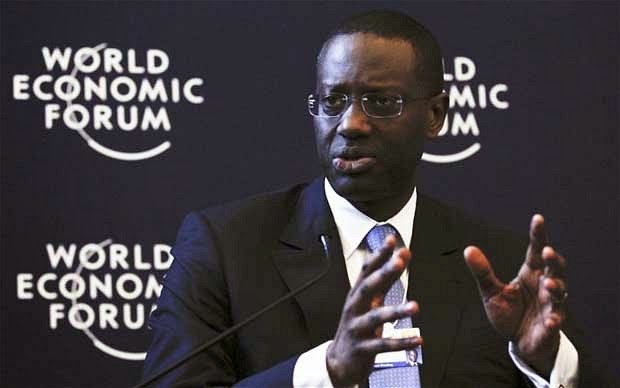 |
| Credit Suisse decided Tidjane Thiam was the right leader at a pivotal time. |
Regulators have concluded that the balance sheet is crammed with risky assets. And the bank has had to manage through legal investigations of U.S. citizens with Credit Suisse accounts evading taxes. (It recently paid a billion-dollar-plus settlement to resolve that issue, at least for now and at least for this side of the Atlantic).
In 2014, the bank recorded profits hovering about or above $2 billion for the second straight year. But its board of directors huddled and decided that might be inadequate. Last year's profits result in an almost-embarrassing 4.5% ROE, while other big global peers, competing on the same stage and wrestling with the same issues, fared much better or continue to show improvement. (Its cross-town rival, UBS, has gone through its own restructurings, but bounced back last year with earnings above $3 billion and returns on capital above 6%.)
This month, it paved the way for its CEO Brady Dougan, known for much of his career for a beaming track record in investment banking, to step down. Credit Suisse didn't replace him with a like-minded senior banker and hired someone in the mode of a strong business manager who must make tough decisions as soon as he slides his CEO seat. Tidjane Thiam, who is from Cameroon and has an INSEAD MBA, becomes one of the few CEO's or Chairs of African- or African-American descent to lead a global financial institution. (Kenneth Chennault continues as CEO of American Express.)
Credit Suisse's choice is interesting. Thiam may not have been on any public short list of those expected to take over the bank, now or in the years to come. However, it's not a shocking appointment after you examine Thiam's track record, one that is consistent, broad, and filled with operational accomplishments. He will arrive at Credit Suisse after having led Prudential, the British insurance company, not the one based in New Jersey.
Credit Suisse has decided it has arrived at a junction where it must make important operational and strategic decisions about the bank. Thiam, therefore, might have been the best person to make these decisions on Day 1 and consider how the bank should change course. With little background in banking, but significant relevant experience in risk management and global operations, Thiam was likely chosen for proven skills in business management, including skills picked up also from his years at McKinsey, the consulting firm, and in government service.
The bank, too, may have decided that after Dougan, the experienced deal-maker, it needed business leaders from the schools of Warren Buffet and Jamie Dimon. Dimon, JPMorgan Chase's CEO the past decade, is always first to say he leads his bank as a "business manager," not a "banker." (In fact, Dimon--at least internally--refers to JPMorgan as "the company," not necessarily "the bank" or "the institution.")
Bankers close deals, advise clients, finance corporate activities, comfort clients and bring in new ones. Business managers manage operations, invest in new businesses, shut down poor-performing units, cut costs and obsess over cost efficiencies, balance-sheet strength, and returns on capital.
Global bank management at the senior levels has evolved into just that. Bank management these days implies running complex organizations with tentacles in all corners of the work. Senior leaders must make excruciatingly tough decisions about capital allocation, cybersecurity, regulation, risk management, business investment, technology efficiencies, and cost control. This means they don't devote as much time to do deals, trades, investment management, and client-schmoozing.
Credit Suisse, like many of its peers, is trying to decide what it will be, where it will be, and for whom. And while at it, it must decide how to boost so-so returns, reduce the risks on its trillion-dollar balance sheet, and decide what business lines should it emphasize and which ones to reduce or withdraw from. Just like all other global banks, some would say. Except some banks, like Credit Suisse, UBS, and RBS must decide sooner than later. Citi, many will agree, made these strategic, balance-sheeting-paring decisions a few years ago and is experiencing brighter days.
Thiam still has weeks before he joins, but rumors and reports abound that he plans to reduce the bank's emphasis on investment banking (eliminate 3,000 IB jobs?), address the abundance of risks on the balance sheet, decide how much more in capital and resources to re-deploy for private banking, and consider how global it should be.
If investment banking fades a little into the background, the bank will have retreated from its celebrated roots cultivated by First Boston, the once large, prestigious U.S. investment bank Credit Suisse acquired in the 1990's. (First Boston had a long-time historical alliance with Credit Suisse. After it ran into difficulties during a spate of excessive deal-making and bridge loans in the 1990's, it sold out to the Swiss bank.)
What will be Thiam's directive from the board? How much time will it give him? Corporate, regulatory and balance-sheet issues will be hurled at Thiam the first day he arrives. European regulators will pressure him to improve capital ratios. Investors, capital markets, and trading counter-parties will press for details of his strategy.
Investors so far have approved the selection. Share prices (based on ADR's, dominated in dollars) had fallen last year from $32/share to $20/share, while the market watched the bank confront many of these issues. Thiam's announcement pushed the price up 25%. Even before he has settled onto the banking battlefield, investors surmise he'll remold and define the bank in the way it should be. Let's see what happens. But let's give him at least a year.
Tracy Williams
See also:
CFN: UBS Throws in the IB Flag, 2012
CFN: Why Was Citi's CEO Asked to Resign? 2012
CFN: Wells Fargo: Sticking to What It Does Best, 2014
CFN: Can Morgan Stanley Ever Please Analysts? 2012
CFN: What About Corporate Banking? 2010









No comments:
Post a Comment